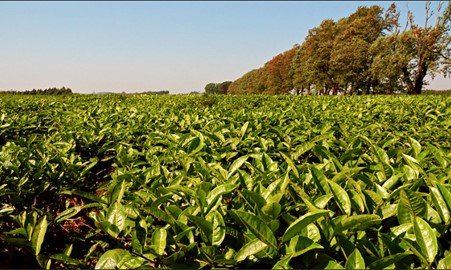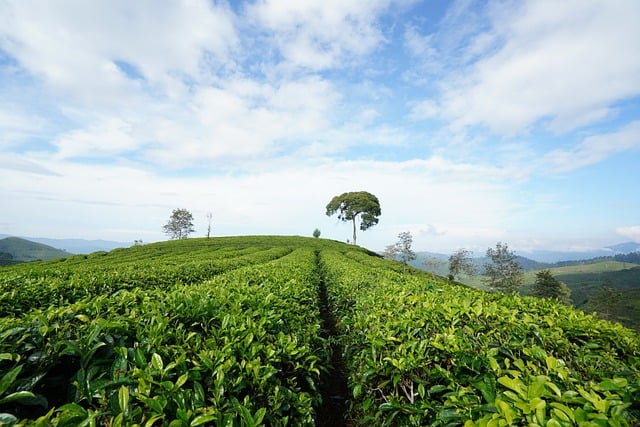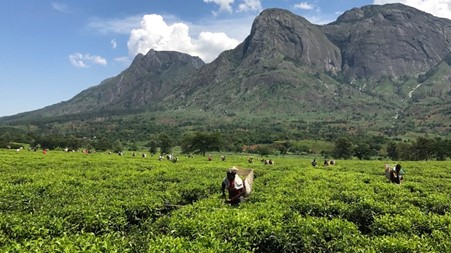Exploring Climate Change Impacts on Livelihoods in Malawi’s Tea Sector
Countries / Regions
Malawi
Partners
Evidence for Development (EfD)
Funders
Walker Institute
Timescale
Project Team
Stella Ngoleka, PhD Candidate, Walker Institute
Supervisors: Prof. Rosalind Cornforth, Walker Institute; Dr Celia Petty, Walker Institute; Prof. Henny Osbahr, University of Reading;
Background
Malawi’s tea sector plays a pivotal role in the country’s economy and rural livelihoods. It is mainly produced in the southern districts of Mulanje and Thyolo. Tea is Malawi’s second-largest agricultural export, providing employment for thousands of labourers and supporting the livelihoods of smallholder farmers. However, the sector faces challenges due to the impacts of climate change, including rising temperatures, erratic rainfall patterns, and extreme weather events such as cyclones and floods. These climatic stresses threaten not only tea yields and quality but also the income and food security of farming communities.
This project focuses on three key areas to address these challenges:
- Climate-Related Vulnerability (Paper One): Investigates how climate change impacts tea production, household income, and food security using HEA and Climate storyline.
- Adaptation Strategies (Paper Two): Evaluates the effectiveness of local adaptation strategies, such as crop diversification, through focus groups and stakeholder interviews.
- Policy Barriers (Paper Three): Identifies governance, weather communication and funding gaps that hinder adaptation, engaging policymakers and stakeholders to inform evidence-based policy solutions.
This research integrates local experiences and institutional insights to propose actionable pathways for enhancing climate resilience in Malawi’s tea sector. This project seeks to bridge these gaps by employing a multi-dimensional approach to understand and address the barriers to climate adaptation in the tea sector. By focusing on both the lived experiences of smallholder farmers and the broader institutional and policy contexts, this research aims to provide actionable insights to strengthen climate resilience and sustainable livelihoods in Malawi’s tea-growing regions.


Our Research
The research utilizes a combination of the Household Economy Approach (HEA), Individual Household Method (IHM), and quantitative climate storylines to explore three core objectives:
- Climate-Related Vulnerability: Investigating the relationship between climate change, tea production, and household income in Mulanje and Thyolo.
- Adaptation Strategies: Evaluating the strategies employed by smallholder tea farmers to address climate-related vulnerabilities.
- Policy Integration: Identifying soft barriers such as communication gaps, funding gaps, governance challenges, and weak policy linkages to inform. evidence-based climate adaptation policies.
Data collection involves household surveys, key informant interviews, focus groups, and spatial GIS analyses to provide comprehensive insights into tea sector vulnerabilities and adaptation pathways.
Our Research
The research utilizes a combination of the Household Economy Approach (HEA), Individual Household Method (IHM), and quantitative climate storylines to explore three core objectives:
- Climate-Related Vulnerability: Investigating the relationship between climate change, tea production, and household income in Mulanje and Thyolo.
- Adaptation Strategies: Evaluating the strategies employed by smallholder tea farmers to address climate-related vulnerabilities.
- Policy Integration: Identifying soft barriers such as communication gaps, funding gaps, governance challenges, and weak policy linkages to inform. evidence-based climate adaptation policies.
Data collection involves household surveys, key informant interviews, focus groups, and spatial GIS analyses to provide comprehensive insights into tea sector vulnerabilities and adaptation pathways.

Our Impact
The project aims to:
- Enhance understanding of the socio-economic impacts of climate change on Malawi’s tea sector.
- Support the development of evidence-based policies that strengthen resilience among smallholder farmers and labourers.
- Foster collaboration between policymakers, farmers, and stakeholders to address governance, weather communication and funding challenges.
- Contribute to global knowledge on climate adaptation through climate storyline focusing on soft barriers and policy gaps


